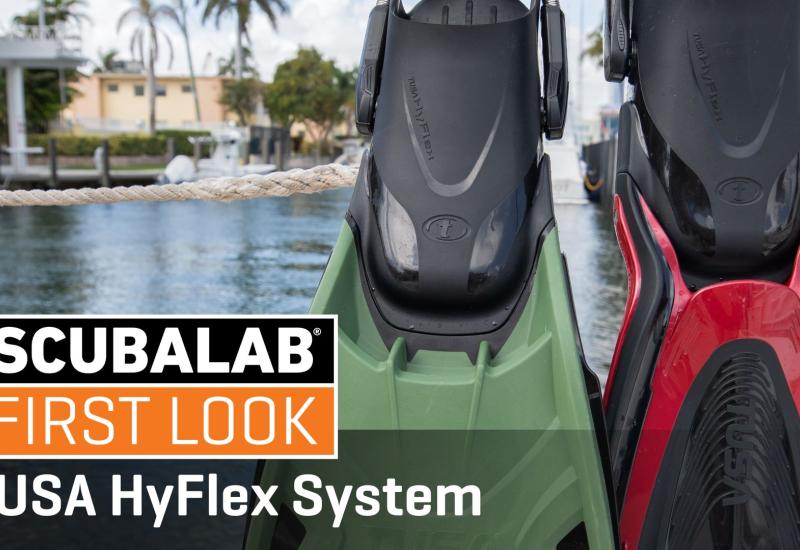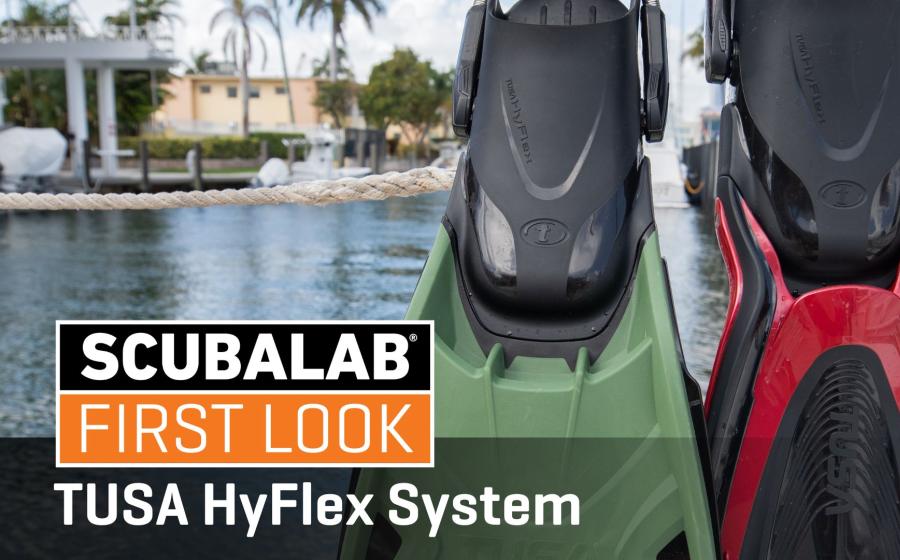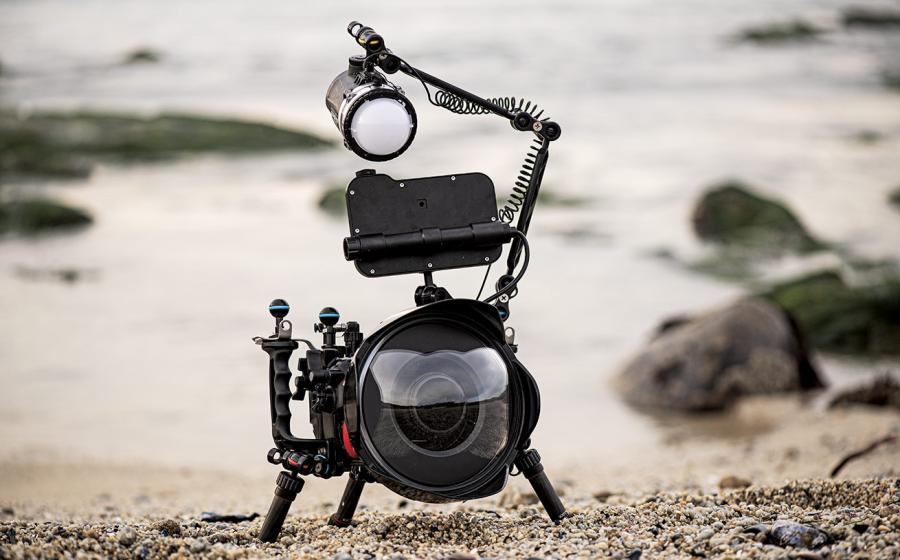Best New Dive Computers Reviewed
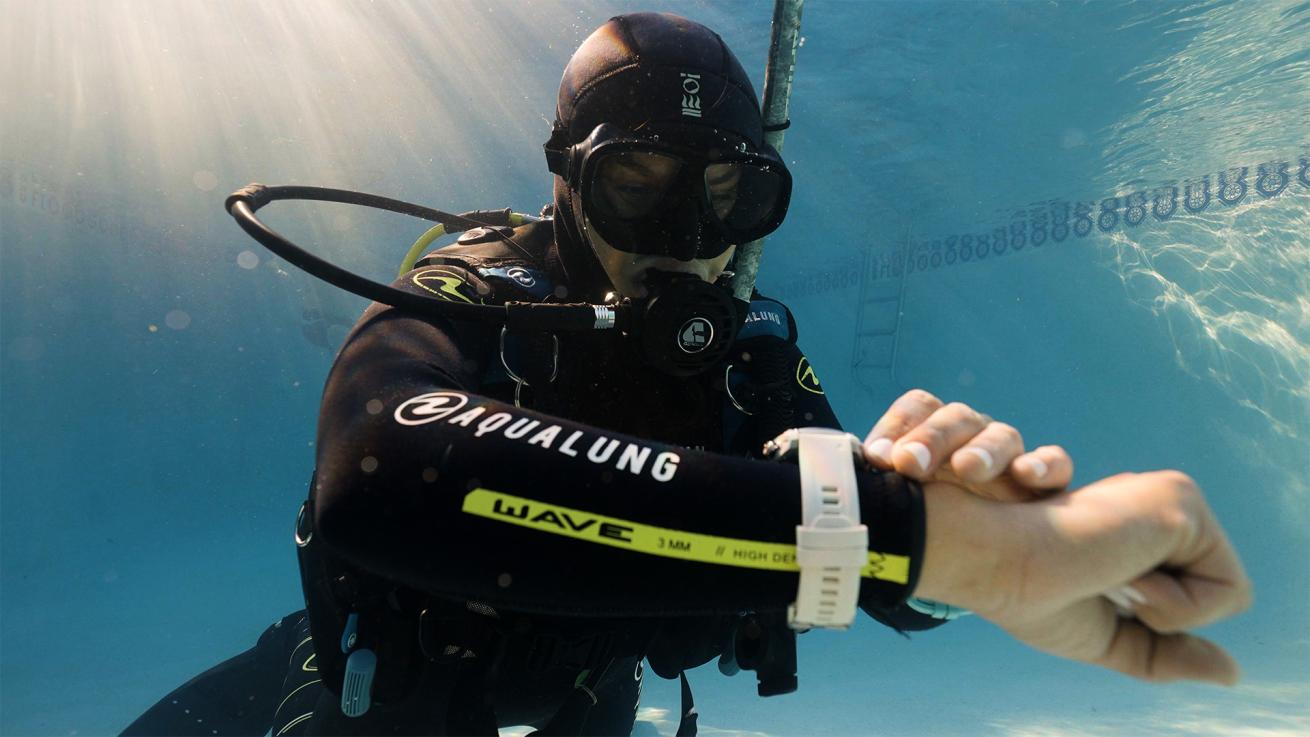
Head-To-Head Testing
How We Test
Our test evaluated two aspects of a computer’s performance: how easy it is to operate and understand before, during and after a dive, and an objective measure of its decompression algorithm relative to other computers in the test.
Test-Dive Protocol
Test divers evaluated computers in nine performance categories. Dives were conducted at Blue Grotto Dive Resort in Williston, Florida. Equipped with underwater slates, divers scored computers in several performance categories.
The scoring is as follows: 1 = poor, 2 = fair, 3 = good, 4 = very good and 5 = excellent. Divers made written comments to record their observations while using each computer. After diving each computer, they ranked their favorites.
Test Perfomance Categories Were:
■ Intuitiveness and ease of operation, including configuring settings and alarms
■ General ergonomics, such as size and shape, comfort and effectiveness of buttons, straps
■ Ease of reading screen at the surface, including in sun
■ Ease of reading screen underwater, including performance of backlight
■ Overall quality of dive display, including data selection and presentation, with a focus on how clearly it presents critical dive info
■ Usefulness and ease of accessing alternate dive-screen data
■ Safety-stop performance, including alerts and timer
■ Ease of accessing and usefulness of surface interval data, including no-fly time
■ Onboard log data, including ease of access
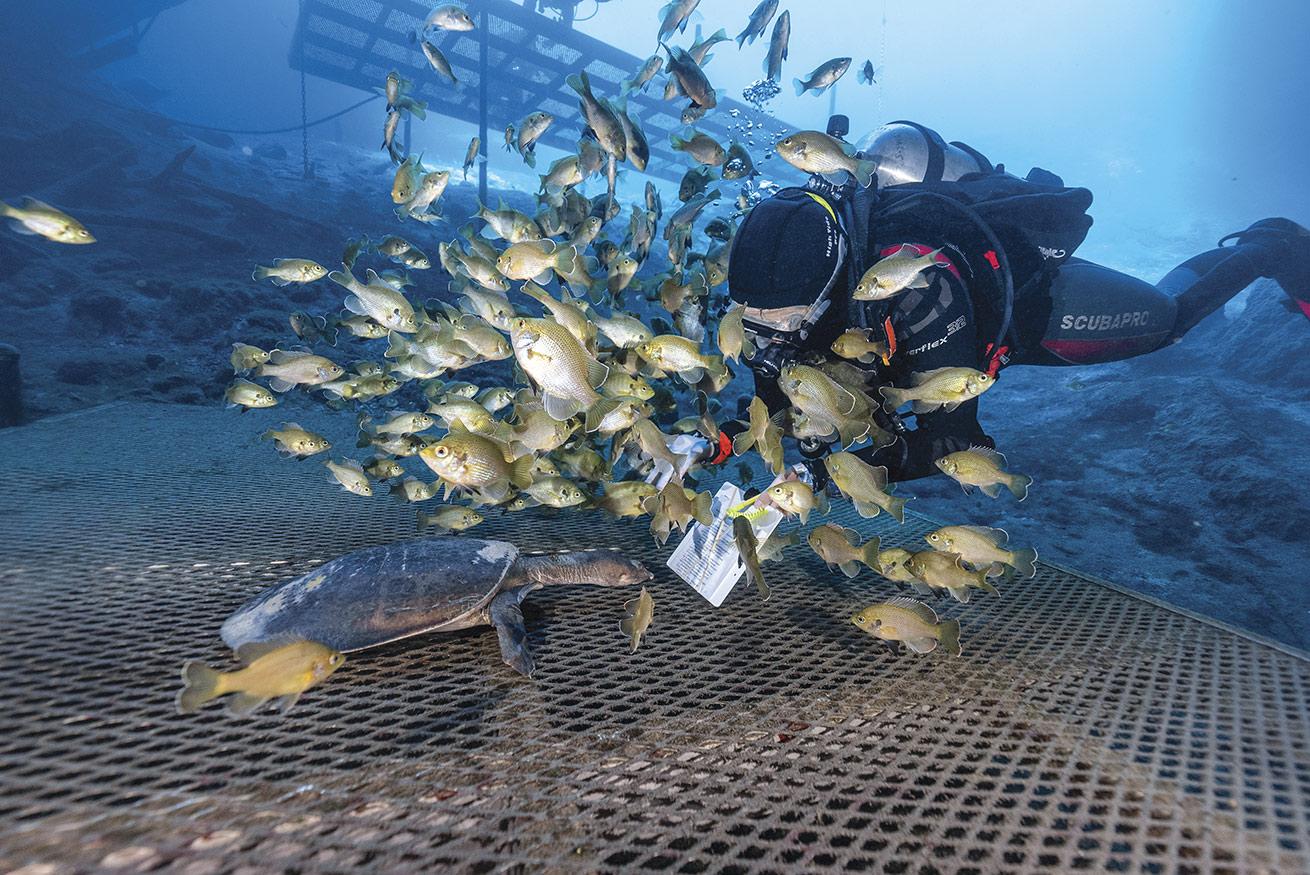
Kristin PaterakisVirgil the turtle, a popular attraction at Blue Grotto Dive Resort, takes a look at a test diver's score sheet.
Objective Test Protocol
To gauge the relative conservatism or liberalism of the computers’ algorithms, they were set to their most liberal settings and subjected together to a series of four dive simulations in the University of Southern California Catalina Hyperbaric Chamber. Meant to simulate a day of diving, the multistage profiles were: 100 feet/55 minutes; a one-hour surface interval; 70 feet/45 minutes; a two-hour surface interval; 80 feet/45 minutes; a one-hour surface interval; and 60 feet/40 minutes.
To see the full chambertest NDL readings for each computer, go to scubadiving.com.
Special thanks to Catalina Hyperbaric Chamber Director Karl E. Huggins and operators Stuart Berryhill, Larry Harris and Mike Kennedy.
Related Reading: Your First Set of Scuba Gear: A Buyer's Guide
TECHNICAL
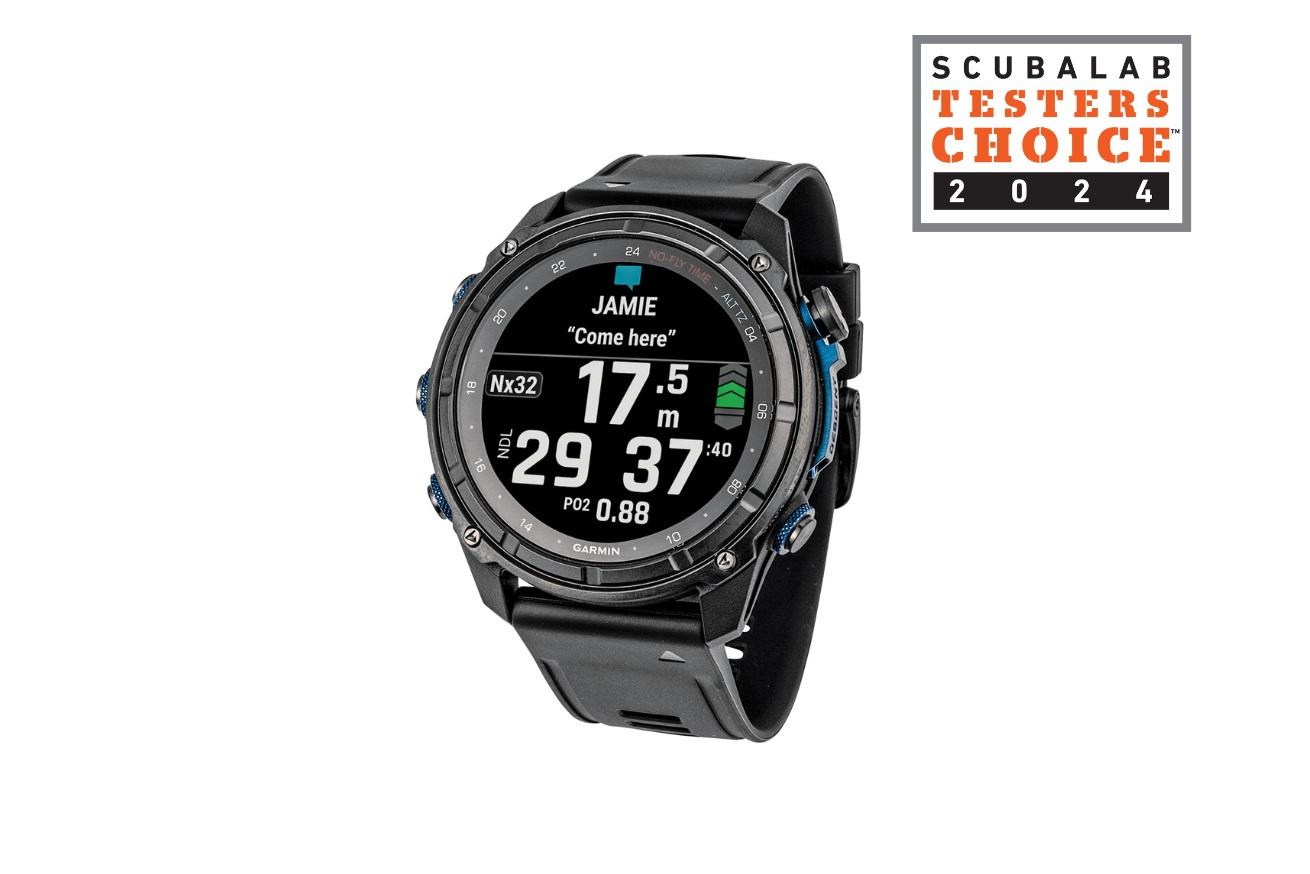
Garmin
Descent MK3 and MK3I
MSRP $1,199.99 (43 mm Mk3), $1,399.99 (43 mm Mk3i), $1,599.99 (51 mm Mk3i), $499.99 (T2 transmitter)
CONTACT garmin.com
Garmin continues to refine its Descent line with the Mk3, keeping everything divers have come to love and adding a touchscreen display to complement its logical—though somewhat intimidating—five-button operation. The bright AMOLED screen is sharper and more vibrant than ever. It earned an excellent score for ease of reading at the surface and very good at depth.
The dive display has been updated slightly and retains a clean, uncluttered layout that keeps critical dive data ever present. Alternate screens include a stopwatch, an excellent digital compass and customizable screens. Alerts, including the beginning and end of safety stops, are accompanied by unmissable vibrations.
The Mk3i version offers air integration in both a 43 mm and 51 mm case size, and can be used with Garmin’s next-gen T2 transmitter to send and receive preset messages underwater. The larger model includes a built-in LED light. Watchlike ergos, advanced functionality, a crisp display and a streamlined operation make the Mk3 series a great option for beginners and veterans alike, especially those who would take advantage of its myriad topside features. Earning very good scores across the board, the Mk3 and Mk3i were a favorite of test divers and are our Testers Choice for technical computers.
DOWNLOAD Bluetooth
BATTERY Sealed rechargeable
MODES 4; open-circuit, CCR, gauge, apnea
GASES 12; 5-100% O2; 0-95% He; air and non-air integrated models
FIRMWARE VERSION 16.25
SCORES Intuitive Operation: 4 Dive Display: 5
"Has everything and still super easy to operate."
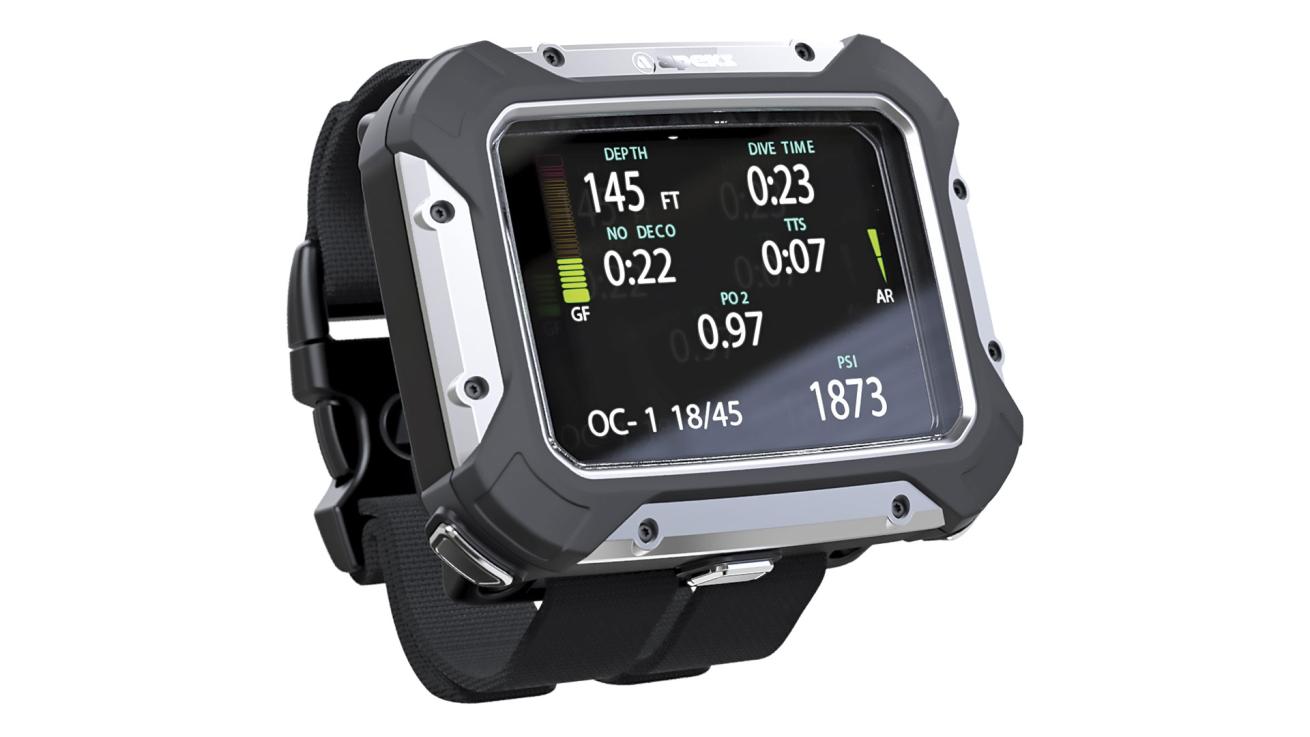
Apeks
DSX
MSRP $1,199, $375 (transmitter)
CONTACT us.apeksdiving.com
Built tough and packed with features, the titanium-framed DSX acts as a wrist-mounted dive command center that’s prepared for anything. The 2.4-inch color TFT LCD display provides generous real estate for lots of data without feeling cluttered. The NDL is displayed in hours and minutes, exhibiting the computer’s technically minded disposition. Even though it’s built for more demanding dives, it is super simple to operate thanks to logically organized menus and helpful on-screen prompts. Several shortcuts provide quick access to gas mix info and other frequently used settings. However, not all test divers cared for the widely spaced layout of the three-button operation.
Alternate dive screens provide an underwater compass with stopwatch, access to user-uploaded reference images and slates, and point-to-point surface navigation using GPS. Additionally, the DSX comes with a dedicated plug-in nitrox analyzer that lets users measure and set their gas mix directly on the computer (R22 type O2 cell not included). Vibrant colors and vibrations are used to alert users to critical alarms. The included dual elastic straps can be difficult to don, and leave extra strap when using a thinner wetsuit, but are well suited for thicker, bulkier exposure gear—the housing also has anchor points for bungees. Users can connect to the DiverLog+ app to download logs and update dive settings on the computer. The built-in rechargeable battery offers up to 80 hours of run time.
DOWNLOAD Bluetooth
BATTERY Sealed rechargeable, with inductive charging
MODES 4; open-circuit, sidemount, CCR, gauge
GASES 6; 7-100% O2; 0-93% He, air-integrated
FIRMWARE VERSION R-1008
SCORES Intuitive Operation: 4 Dive Display: 4
"Excellent build quality with easyto-understand info."
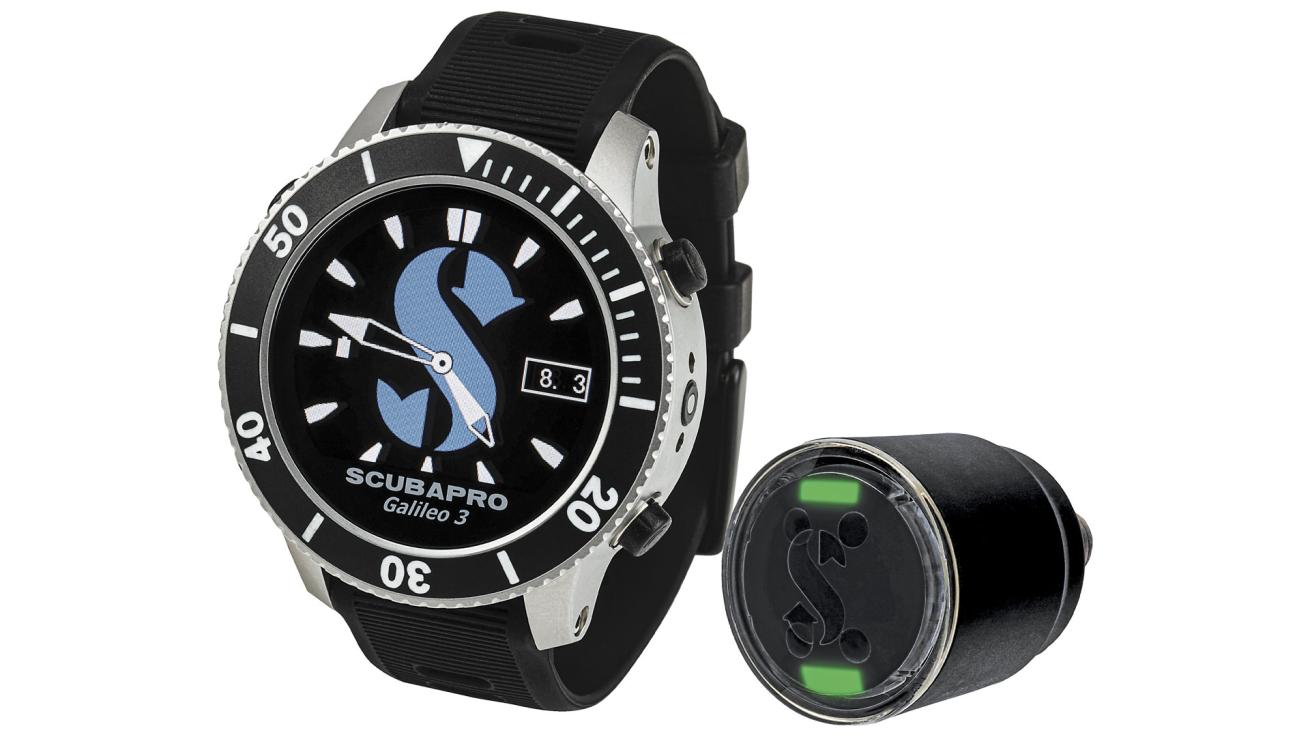
ScubaPro
G3
MSRP $800, $1,050 (with transmitter)
CONTACT scubapro.com
Sporting a functioning one-way rotating bezel, the G3 perfectly combines modern top-of-the line dive capabilities with a timeless aesthetic. It includes air integration, two algorithm choices, support for advanced diving disciplines, and limited smartwatch and sport functions. Testers appreciated the heft and durability of its stainless-steel case and loved the ergonomic rubber strap. To streamline menus, the computer hides advanced modes and settings until the user chooses to enable them.
The operation has some idiosyncrasies—for example, some menus can only be entered from specific screens or require two button presses to enter — which can make navigation a bit confusing at first. The color display includes a backlight, and is easy to read above and below the water. Dive data is arranged in a blocky grid like pattern. A simplified display mode uses larger characters and fewer data fields for a cleaner experience. In both modes, most secondary data is restricted to a single window and must be cycled through one by one. Alternative screens include a compass, dive profile graphic and access to user-uploaded images.
DOWNLOAD Bluetooth
BATTERY Sealed rechargeable
MODES 5; open-circuit, sidemount, CCR, gauge, apnea
GASES 8; 8-100% O2; 0-98% He, air-integrated
FIRMWARE VERSION 1.2
SCORES Intuitive Operation: 3 Dive Display: 4
Related Reading: Best New Scuba Gear May 2024
"Beautifully made. As much a piece of jewelry as a dive watch."
RECREATIONAL
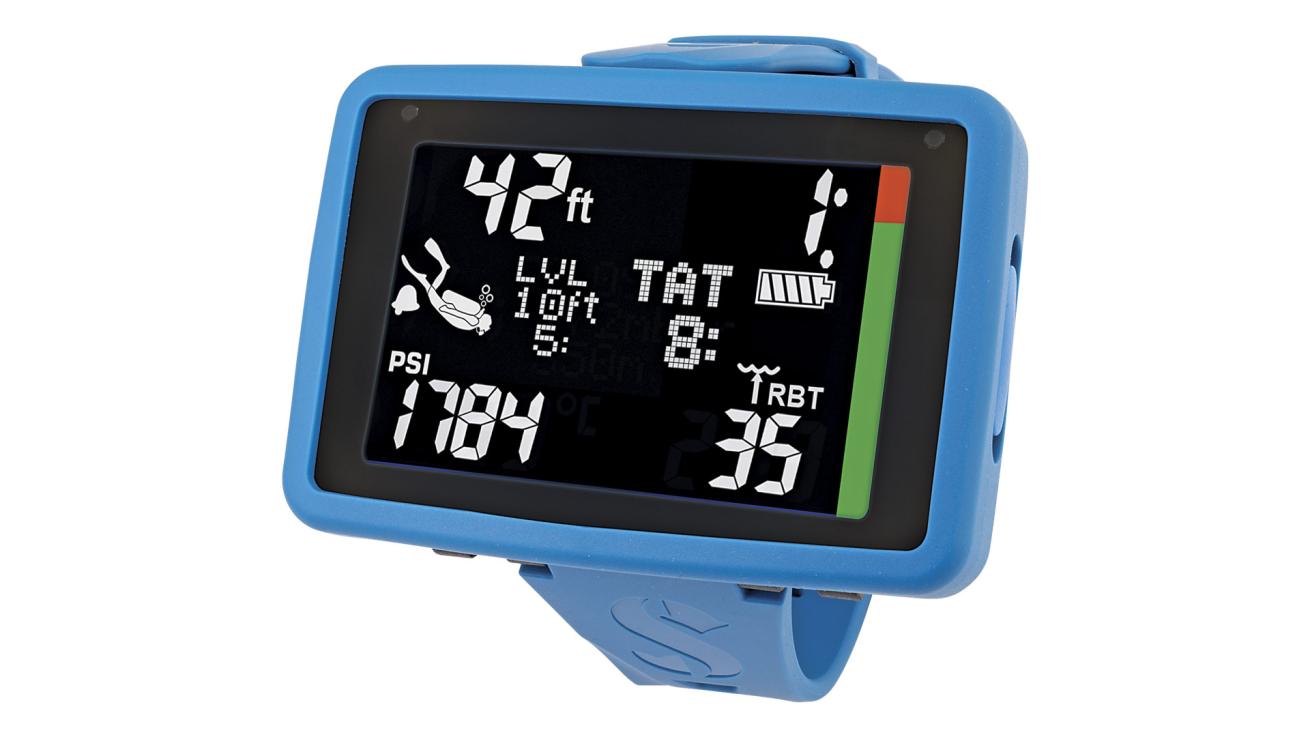
Scubapro
Luna 2.0 AI
MSRP $430, $315 (transmitter)
CONTACT scubapro.com
The Luna 2.0 uses an oil-filled design, which lets it withstand the pressures of the deep while maintaining a slim profile and lightweight comfort. The computer’s large black and white LCD display has large contrasting characters around the perimeter to indicate depth, dive time, tank pressure and remaining bottom time based on gas consumption. No deco time, stop info and all other data are shown on the central dot-matrix display, which provides additional resolution for improved legibility.
A user-activated backlight helped the Luna 2.0 score very good for overall ease of reading. Alerts are shown on the dot-matrix display with a reverse color scheme and can be accompanied by a red flash from the backlight. The two-button operation is straightforward, but the placement of the buttons makes the ergos a bit clunky, especially for divers with smaller hands. Navigation can be frustrating until the user memorizes the sometimes cryptic icons and the appropriate times to use short and long presses. Menus are organized but can be quite deep. The Luna 2.0 is an accessible option for beginners looking for a competitively priced air-integrated computer.
DOWNLOAD Bluetooth
BATTERY User-replaceable CR2450
MODES 3; open-circuit, gauge, apnea
GASES 3; 21-100% O2, air integrated
FIRMWARE VERSION V.1.2
SCORES Intuitive Operation: 3 Dive Display: 3
"Display is large and clear."
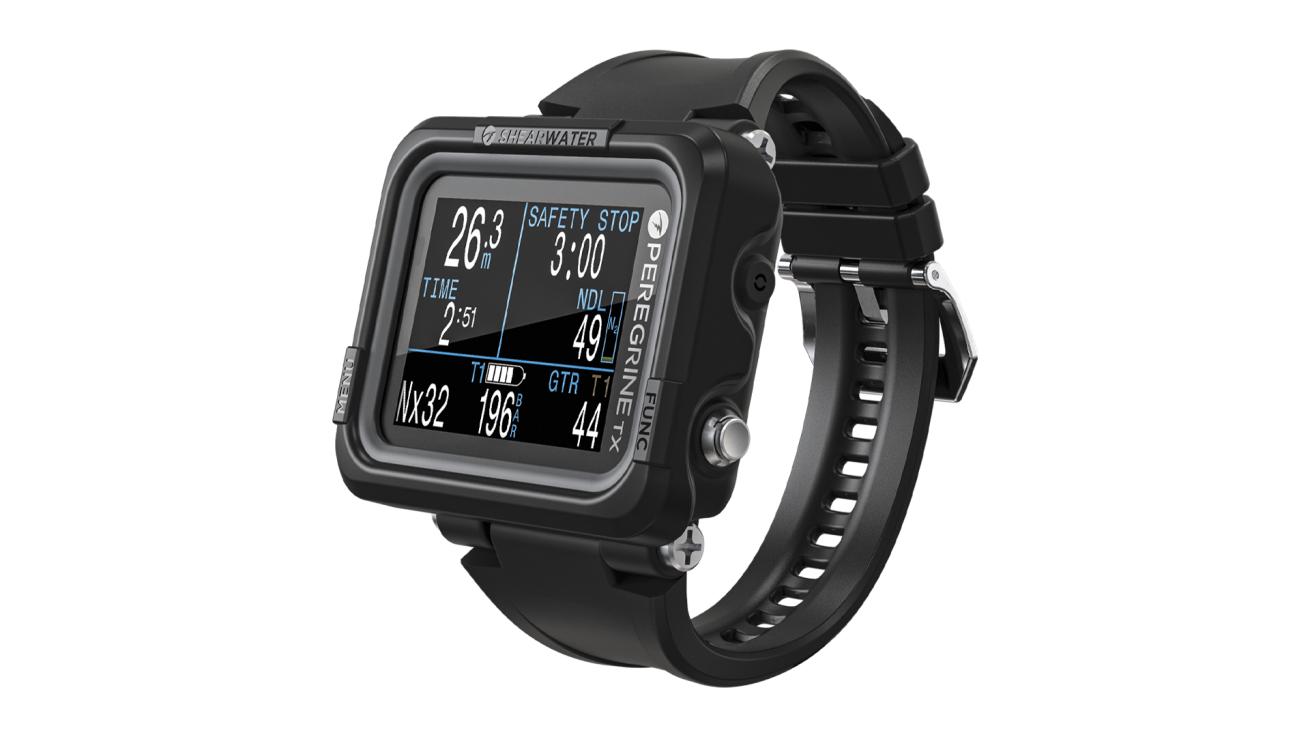
Shearwater
Peregrine TX
MSRP $700, $400 (transmitter)
CONTACT shearwater.com
The Peregrine TX takes everything great about Shearwater’s original recreationally oriented dive computer and adds on wireless air integration with up to four transmitters and a digital compass, ensuring users will have everything they need as they progress as a recreational diver. Test divers loved the computer’s 2.2-inch full-color display and scored it excellent for readability in all conditions. It features large characters, an adjustable backlight and clear organization of dive data. The two-button operation is logical and intuitive, with helpful on-screen guides.
The computer is a bit boxy, but thin. It scored very good for ergonomics and retains a comfortable size for the average diver. Just because the Peregrine TX doesn’t have advanced technical modes doesn’t mean it doesn’t have robust features. Test divers loved the computer’s vibrating haptic feedback for alarms and customizable display. The tec curious will benefit from sidemount configuration, three-gas nitrox and compatibility with up to four transmitters. For those divers interested in a large display, it’s hard to go wrong with the Peregrine TX.
DOWNLOAD Bluetooth
BATTERY Sealed rechargeable, with wireless charging
MODES 3; open-circuit, sidemount, gauge
GASES 3; 21-100% O2; air integrated models (non-air integrated version available)
FIRMWARE VERSION V98
SCORES Intuitive Operation: 4 Dive Display: 5
"Good screen space with lots of useful data."
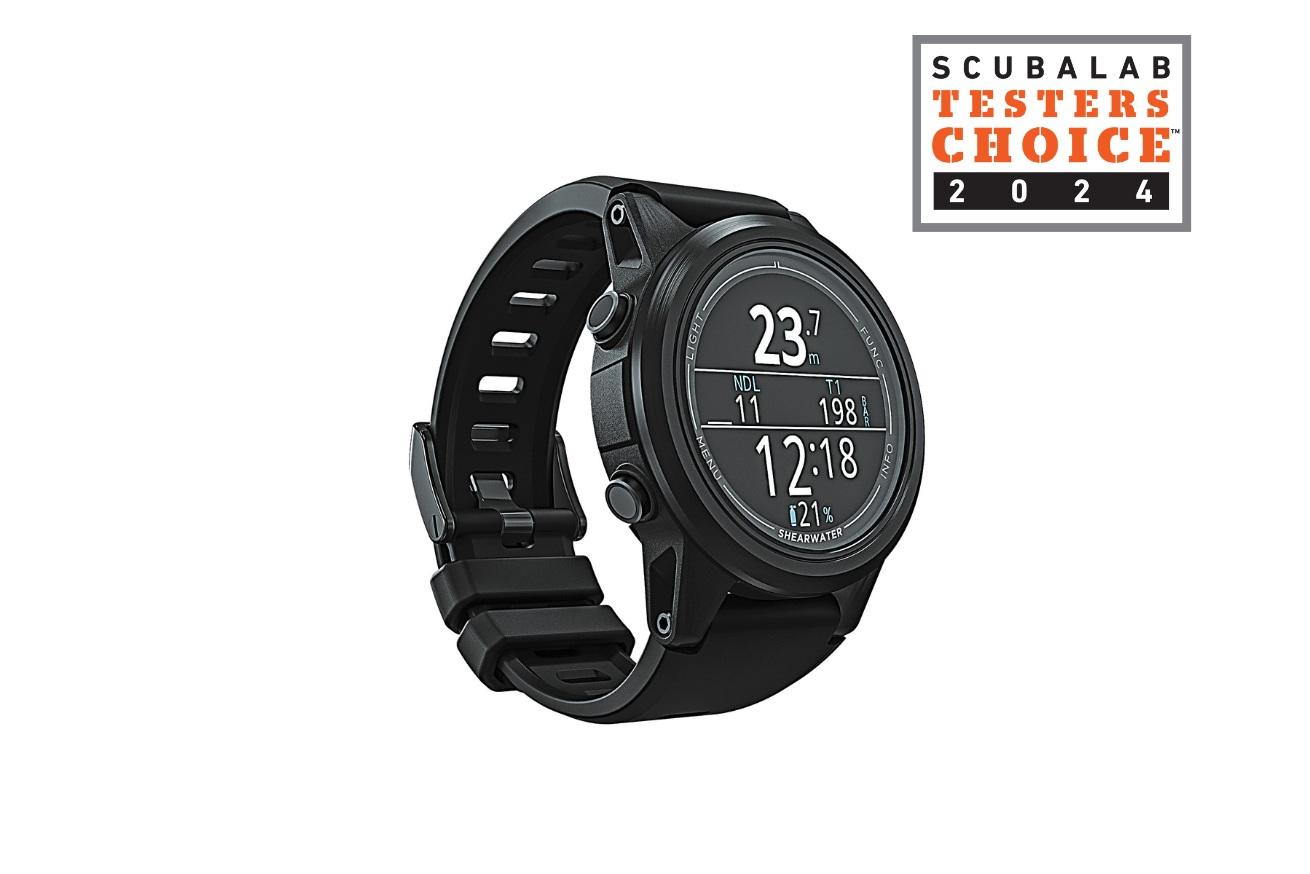
Shearwater
Tern and Tern TX
MSRP $650, $775 (Tern Tx), $400 (transmitter)
CONTACT shearwater.com
The compact, watch-size Tern scored excellent almost across the board. Testers loved its wrist-friendly ergonomics and brilliant high resolution color display. It is easy to pick up the ins and outs of the four-button operation. Testers especially liked the one-touch brightness adjustment. The dive display has a clean appearance and logical organization, with the option to customize data fields, change color schemes and activate a Big Numbers mode.
The Tern has nitrox and freediving support by default. The Tern TX adds wireless air-integration and a digital compass, providing everything a recreational diver could need. The compass can be viewed via a dedicated screen or a minimalist overlay. There’s a wealth of secondary data that is easy to cycle through quickly. Testers also loved the attention-grabbing vibrating alerts, especially at safety stops. In addition to a sleek design and robust performance, the Tern also includes high-end extras like wireless inductive charging and quick-release straps. A favorite of testers, offering excellent performance, the Tern and Tern TX are our Testers Choice for recreational computers.
DOWNLOAD Bluetooth
BATTERY Sealed rechargeable, with wireless charging
MODES 3; open-circuit, gauge, apnea
GASES 3; 21-100% O2; air and non-air integrated models
FIRMWARE VERSION V26
SCORES Intuitive Operation: 4 Dive Display: 5
"Feels great [on the wrist]. Easy and intuitive to use."
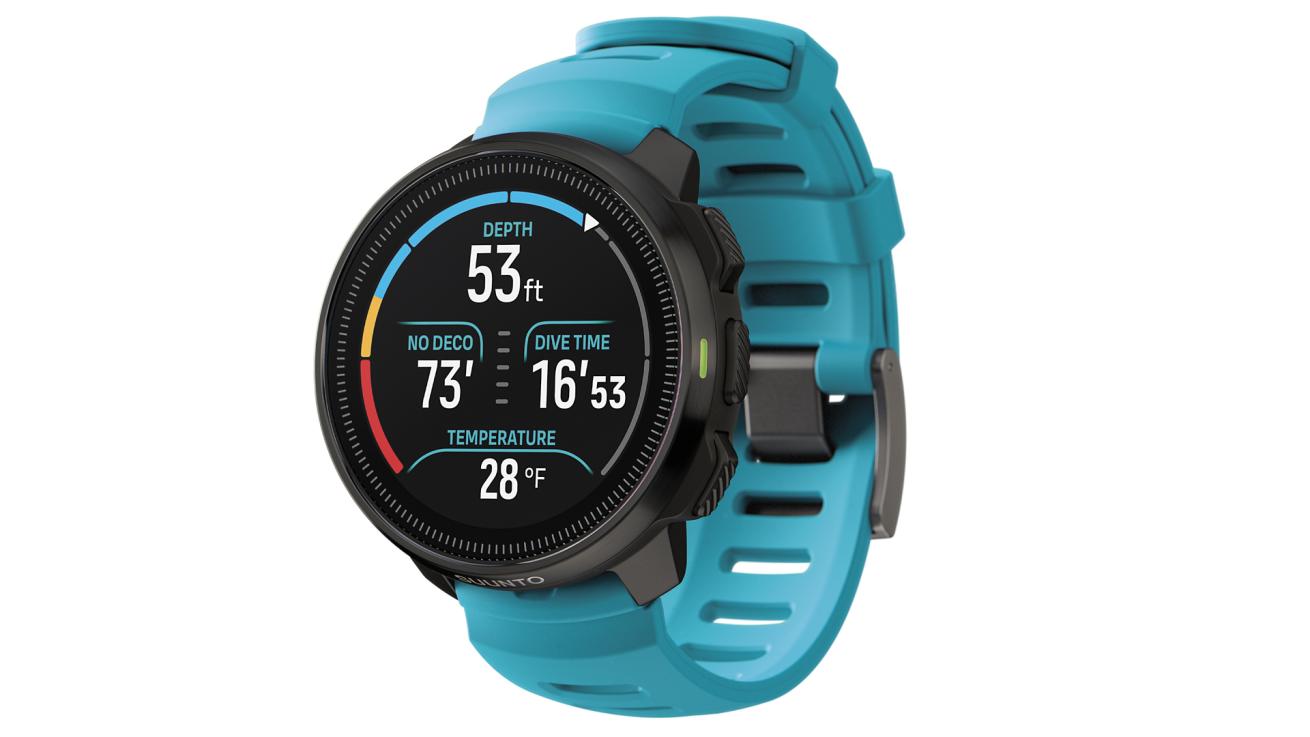
Suunto
Ocean
MSRP $899.95, $1,199.95 (with transmitter)
CONTACT suunto.com
This watch-size computer includes full support for recreational diving, including air integration and nitrox. It also has smartwatch functionality and fitness tracking for over 95 sport activities. The intuitive controls and responsive touchscreen make short work of navigating the long, if logically organized, menus. The display has an adjustable backlight for excellent visibility. While diving, it boldly showcases NDL, depth and dive time with large characters.
A graphic along the perimeter of the display toggles between counting down NDL, tank pressure and stop info. Other data, including a simple digital compass—which was added via an update after our testing—is relegated to a single field. Testers really liked the uncluttered display and its use of bold colors and vibrations to call attention to alerts. Adjusting the algorithm’s conservatism can only be done by using gradient factor values, which struck us as oddly technical given the computer’s obvious inclination to casual recreational users. Overall, the Ocean provides a friendly operation, slick interface and premium ergos that made it a favorite of multiple divers.
DOWNLOAD Bluetooth
BATTERY Sealed rechargeable
MODES 3; open-circuit, gauge, apnea
GASES 5; 21-100% O2, air-integrated
FIRMWARE VERSION 2.34.42
SCORES Intuitive Operation: 4 Dive Display: 4
Related Reading: Best New Dive Gear December 2024
"Easy [operation], gorgeous and a pleasure to use."
CHECKOUT DIVE
While Not Fully Tested, We Did Have The Opportunity To Get This Dive Computer In The Water
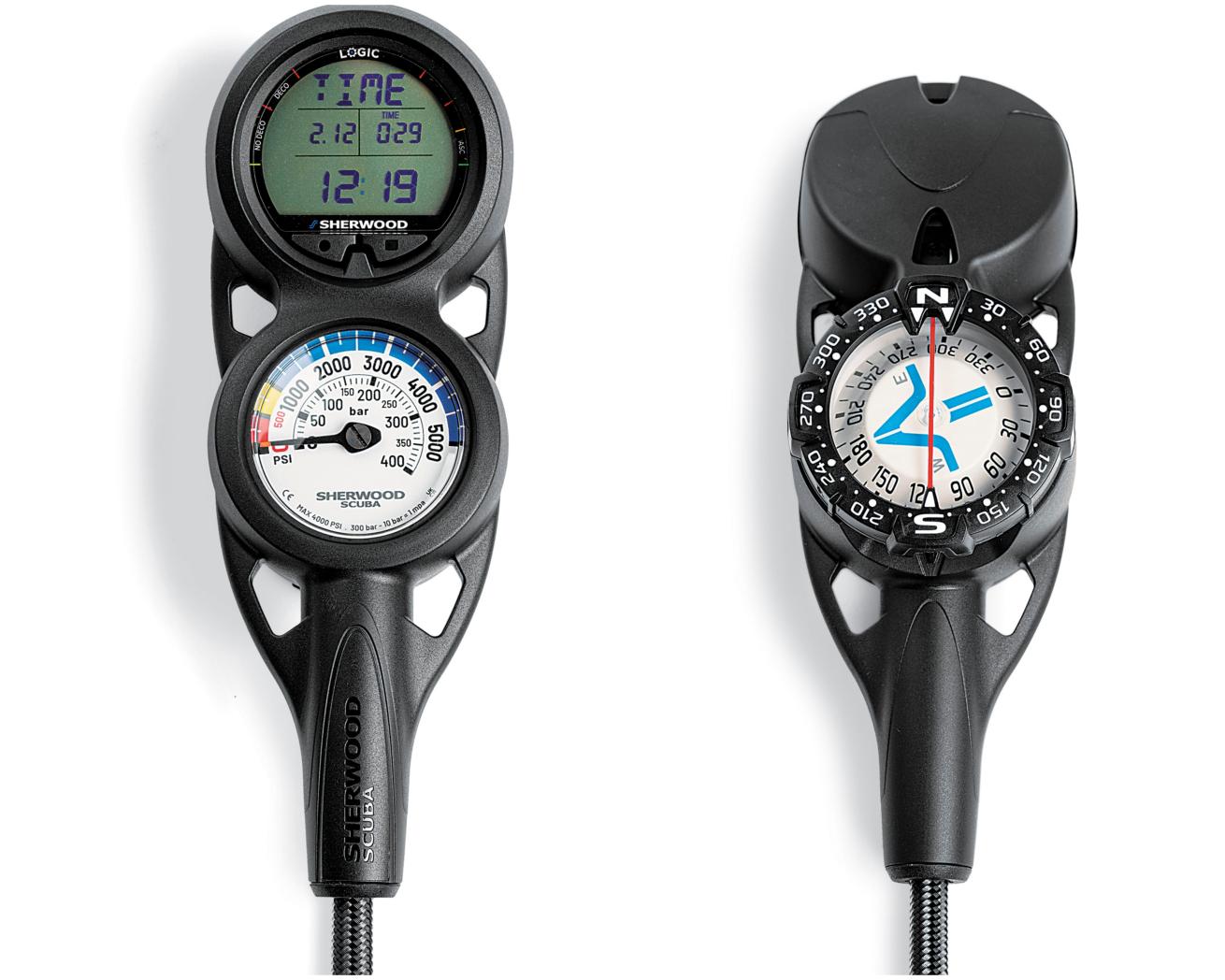
Sherwood
Logic
MSRP $432, $489 (w/ analog compass)
CONTACT sherwoodscuba.com
Installed in a low-profile console boot with an integrated submersible pressure gauge, this puck-style computer offers a slim, lightweight package that is easy to travel and dive with. The console features a flexible braided hose and wide anchor points. It is tiny but very ergonomic, making it easy to hold and operate. The digital numeric display is bold and very easy to read. It is segmented for a clean, organized appearance and features a bright, powerful backlight.
The responsive two-button operation is simple and streamlined. Dive screens and dive logs are also simple but provide all the necessary data in a logical layout. Test divers liked that the dive operation includes time of day and will count down safety/deco stops to the second. The Logic is nitrox compatible and includes wireless dive-log sync to the new Dive Story Pro app. The Logic provides all the essentials in a compact, ergonomic package that won’t break the bank.
DOWNLOAD Smartphone wireless sync
BATTERY User-replaceable CR2450
MODES 2; open-circuit, gauge
GASES 1; 21-50% O2, hose-integrated pressure gauge
FIRMWARE VERSION SH1018
"Easy to read, high contrast."
Making The Most Of It
Our division of computers into “rec” and “tec” categories is purely based on the presence of dedicated dive modes for technical disciplines like trimix and closed circuit rebreather diving. It doesn’t necessarily mean the computers are too advanced for a novice diver, even if their technical modes are. Some rec models also include advanced modes like nitrox that are outside the scope of an initial openwater certification. All the computers in our test provide basic scuba operating modes suitable for any recreational, open-water diver. However, if you ever want to learn more about any of the myriad functions of your chosen computer, PADI offers numerous courses, from underwater navigation to rebreather diving, that will help you use it to its full potential.
The Cutting Edge
Check out these unique features that add never before seen functionality to the modern dive computer.
Underwater Messaging Using the new Garmin T2 transceiver, the Mk3i can send and receive preset messages underwater from up to 30 meters away.
Underwater Tracking Many dive computers now mark GPS coordinates for the beginning and end points of a dive (GPS won’t work underwater), but the Ocean goes a bit further by using its GPS, accelerometer, gyroscope, magnetometer and pressure sensor to sense the diver’s movements underwater. Postdive, users get a 3D visualization of their dive route in the Suunto app.
Onboard Analyzer The DSX includes a unique O2 analyzer that plugs directly into the computer. Not only does this make it easier for divers to carry their own nitrox analyzer, but the device allows the diver to analyze gas and set the gas mix directly on the computer in one go.
Related Reading: Best New Dive Gear December 2024
Ask Robby
Q: Do you recommend a specific computer for visually or audibly challenged divers?
A: It can be difficult to read tiny characters on today’s sleek watchsize computer screens, and audible alerts aren’t always effective under dive hoods. Fortunately, many models include features that can greatly improve the user experience. Big Numbers mode, included on many models in the test, enlarge critical data for improved legibility. Haptic feedback is also widespread; this feature uses unmistakable, unmissable vibrating pulses to signal alarms and alerts.


